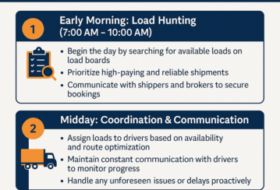Navigating the intricate world of shipping coordination requires a blend of knowledge, skills, and finesse. Shipping coordinators are the linchpins of logistics, ensuring that goods move seamlessly from point A to point B, meeting deadlines and exceeding client expectations. Whether you’re a novice stepping into the realm of shipping coordination or a seasoned professional seeking to enhance your expertise, this comprehensive guide provides essential instructions, tips, and strategies to master the art of shipping coordination effectively.
- Understanding the Role of a Shipping Coordinator
Shipping coordinators oversee the entire shipping process, from coordinating shipments and managing transportation to ensuring timely deliveries. They act as the crucial link between suppliers, carriers, and customers, ensuring smooth operations and client satisfaction. - Essential Skills and Qualities
Effective shipping coordinators possess a diverse skill set, including excellent organizational skills, attention to detail, time management, problem-solving abilities, and adaptability. They are proactive, able to multitask, and thrive in a fast-paced environment. - Familiarizing Yourself with Shipping Documentation
Shipping documentation, such as bills of lading, commercial invoices, and customs declarations, is integral to the shipping process. Coordinators must understand these documents thoroughly to ensure accurate and compliant shipments. - Choosing the Right Shipping Methods and Carriers
Selecting appropriate shipping methods and carriers is pivotal. Shipping coordinators evaluate factors like cost, transit time, reliability, and destination requirements to choose the best options for each shipment, optimizing efficiency and minimizing expenses. - Optimizing Routes and Managing Transportation
Efficient route planning and transportation management reduce transit times and costs. Coordinators analyze routes, consider traffic patterns, and explore transportation modes to optimize shipments, ensuring timely deliveries and cost-effectiveness. - Effective Communication with Stakeholders
Clear and concise communication is paramount. Shipping coordinators liaise with suppliers, carriers, customs officials, and customers. Effective communication fosters collaboration, minimizes misunderstandings, and enhances the overall shipping experience. - Managing Unexpected Challenges and Problem-Solving
Shipping coordinators are adept at handling unforeseen challenges, such as weather disruptions, customs delays, or carrier issues. They employ problem-solving skills to address these challenges swiftly, minimizing impact and ensuring smooth operations. - Utilizing Shipping Software and Technology
Shipping software and technology streamline processes. Coordinators utilize software for order tracking, inventory management, and real-time shipment monitoring. Embracing technology enhances efficiency and provides valuable insights for decision-making. - Ensuring Regulatory Compliance and Documentation
Regulatory compliance is non-negotiable. Coordinators stay updated with international shipping regulations, ensuring shipments comply with customs requirements, import/export restrictions, and industry-specific regulations. Accurate documentation is maintained to facilitate smooth customs clearance. - Continuous Learning and Professional Development
The shipping industry evolves continuously. Shipping coordinators engage in continuous learning, attend industry seminars, and pursue professional development opportunities. Staying updated with industry trends and regulations ensures that coordinators remain at the forefront of their profession. - Conclusion: Excelling as a Shipping Coordinator
In conclusion, excelling as a shipping coordinator demands a blend of knowledge, skills, and adaptability. By understanding the intricacies of the shipping process, honing essential skills, embracing technology, and fostering effective communication, shipping coordinators can navigate challenges and deliver exceptional results. Continuous learning and a proactive approach are the keys to not only meet but exceed client expectations, ensuring smooth shipping operations and building lasting professional relationships. As a shipping coordinator, your commitment to excellence and dedication to continuous improvement will set you apart in the competitive world of logistics, enabling you to excel and thrive in your role.
Growth + Change = Opportunity! How are you going to capitalize on the opportunity as a freight broker, agent, dispatcher or box truck carrier?








